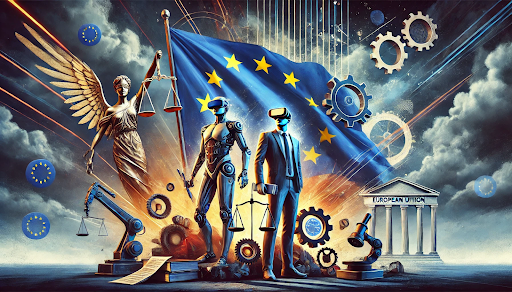On February 3rd, EU leaders meet for a so-called “retreat”. Actually, we need to move forward. Europe can act decisively to protect its democracies.
We are facing a tsunami of fake news, while shaken by U.S. trade and military pressures. Tools like the DSA, DMA, Media Freedom Act, and AI Act are in place to safeguard our information space, but implementation could be weak. Meanwhile, populism is fueled by oligarchs, and platforms operate as though regulation is optional.
Time for Action: A Democracy Action Plan
Early in this crisis, the EU must send a clear message: focus on implementing legislation, not reopening it, and tackling media sustainability. A Democracy Action Plan could in the short term complement the 2025 Commission Work Programme, and notably:
- Spell out what is meant with the ‘democracy shield’ announced by Pt von der Leyen.
- Clarify roles for both Democracy Commissioners that we stakeholders asked for. The Vice President for Digital Sovereignty and the Commissioner for Justice should be aligned regarding regulating platforms, media industrial policy, and funding
- Nurture our information space to combat disinformation and foster media resilience.
- Mainstream Eastern European media for EU support, as US-AID freezes funding
- Convey long-term priorities for the next financial framework.
This Democracy Action Plan will not suffice. Beyond public measures, civil society and business should promptly put economic pressure on those undermining democracy.
Boycotts: Diplomatic-Free Levers
Elon Musk’s ‘X’ disregards EU laws against disinformation and is a political toy for its owner. But Musk depends on Tesla’s European sales to maintain quarterly earnings and board confidence. He is not untouchable—his compensation is controversial, he was previously pushed out of Tesla’s chair, and U.S. subsidies for electric vehicles are stopped.
Meta, meanwhile, openly equates fact-checking and regulation with censorship, prioritizing Trump-era cronyism over ethics. Zuckerberg, unlike Musk, has no “side business” to fall back on, and may not win the AI war. His leadership depends on advertising revenue and investor satisfaction with its share price.
European citizens and advertisers hold the power where it matters most—sales and profits:
- Citizens: Boycott platforms like X and stop buying Tesla cars.
- Advertisers: Move away from platforms like Facebook and Instagram. In 2019, large advertisers raised concerns about their ads monetizing harmful content. GARM (Global Alliance for Responsible Media) was a promising initiative – until legal and financial pressure in the US derailed it. In Europe, actions could move faster. I call upon advertisers to take their own responsibility: demonetizing fake news will both protect their brands, and preserve the market economy and democracy we cherish.
Building our Democracy Infrastructure: media and social media
Europe cannot solely rely on foreign platforms for its digital and media ecosystems. It’s time to strengthen media and build alternative platforms:
- Media cooperation: European media outlets must unite, pooling resources or merging when necessary (I know about corporate governance, and did my bit by bringing the 12-country Euractiv network into the group Mediahuis). Trust indicators rating content could create a virtuous cycle—higher advertising sales, more funding for journalism, and better content quality. Without action, AI risks further destabilising traditional media, just as search engines once bypassed copyright protections.
- Content-sharing platforms: new platforms could use AI to facilitate cross-border sharing of journalism, spreading costly coverage across wider audiences. Press agencies, skilled in gathering and marketing content, could play a central role. These are findings from a feasibility study we did for EU’s DG Connect, regarding content sharing platforms. Many publishers were reluctant, but some now face cooperation or death…
- Alternatives to Twitter:While X remains central to the news cycle, it is easier to replace than Meta or Alphabet apps. Promoting BlueSky or Mastodon is not enough. A market-based, EU-backed ecosystem could provide credible alternatives for citizens, advertisers, and investors.
- ‘Trusted platforms’: for both content-sharing and micro-blogs, the EU could open competitive calls, providing labelling and co-funding.
From Ideas to Real Impact
It’s time to move from endless pipelines of policy initiatives to operational results. EU circles are buzzing with ‘Trump-safe’ ideas, from discreet Commission task forces and MEP groups to think tanks and networks like the Media Grid Initiative and the Conclave. Actions will speak louder than plans.
Take the Stars4Media innovation programme, which has supported 130 media outlets over five years, or the newly launched Maison du MédiaLab, which is tripling Eastern European correspondents. Other focused initiatives could unleash real impact. @Europe MediaLab will consider impactful projects, contributing strategy, advocacy and credible networks among media.
Next steps: with you?
. the Commission should use the NEWS Media Forum (part of the NEWS initiative we advocated in 2020) to consult stakeholders and fast-track new projects
. Interested in follow-up info? ‘like’ this post, add your own initiative, or dm your email, or meet me at the Perugia Journalism Festival!
Let’s shape together Europe’s democracy infrastructure!
(image: ChatGPT- refused to insert Musk & Zuck’ faces: censorship? 🙂 )

